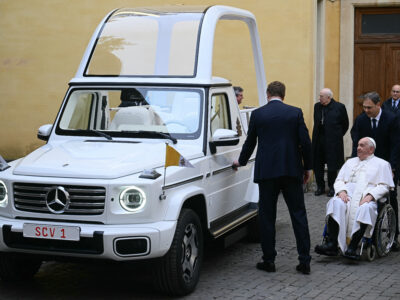Even tucked away in Lycoming County, Pennsylvania, in a little borough named Muncy—population 2,442 after the last census—people are responding to the Pope’s call for Christians everywhere to care for creation.
The Care for Creation volunteer team at the Church of the Resurrection in Muncy has planted an urban forest on their church grounds. The team is steadily transforming their church property into a woodland paradise for pollinators, critters, native species, and people.
When Pope Francis released the Laudato Si—a call to care for our common home—in 2015, the Catholic community all around the globe immediately went to work, including the Church of the Resurrection’s congregation. It took the church a while to determine just what their role ought to be, but eventually, volunteers settled on the idea of an urban forest and began planning for their project.
Since then, the church in Muncy has planted 215 shrubs and trees on their property. They have also installed a blueberry patch with 15 highbush blueberry bushes and raised beds along the perimeter of the blueberry patch for vegetable gardens. The vegetable harvest is distributed through Son-Light House, a social outreach ministry that provides food, clothing, and furniture to individuals in Southeastern Lycoming County.
Shirley Confer Boatman from The Luminary writes, “For years to come, these ambitious projects of the Church of the Resurrection will provide the gifts of beauty, food, oxygen and steps toward rebalancing the ecosystem, all actions that are needed to give back to the Earth and reverse some of the environmental damage that has occurred.”
There are three key takeaways from the Church of the Resurrection’s urban forest project: people everywhere can change the landscape for better, planning and prayer is imperative, and partnerships make a big difference.
People Everywhere Can Change the Landscape
If it seems like all the action is happening in big cities, which hold nearly 39% of the population, the United States is still a nation of small towns. In fact, according to the 2020 U.S. census report, about 76% of the cities and towns in which Americans live have fewer than 5,000 people. Of those, almost 42% have fewer than 500 people.
And 37% of the population doesn’t live in an incorporated town at all.
Image: Church of the Resurrection in Muncy, PA
Muncy—this little borough in Lycoming County, Pennsylvania—is a perfect example of a small-town church community coming together to transform the patch of creation they’ve been given to care for. The work they’re doing will make a hyper-local difference that has the power to affect change on a global scale.
Imagine if every small town across America had a creation care team in just one of their churches, looking out for the local ecosystem.
Planning—and Prayer—Is Imperative
Even though the Laudato Si was released in 2015, it took the Church of the Resurrection community time to discern what their local contribution toward creation care would look like—almost five years, in fact, before the first bush was planted. Volunteers at the church formed a creation care team with the shared vision and mission to make a plan, find resources, and chart a course to bring their vision to reality.
The Holy Spirit is doing a new thing all around the globe, and what the Spirit inspires a church in Muncy, PA to do is going to look different from a church in Albuquerque, NM, Grand Forks, ND, or Charleston, SC. Church communities know the needs of the people in their local community and can connect with area ecological partners to identify the best way to serve the local environment better, draping all of their activity in prayer to discern the guidance of the Holy Spirit.
Partnerships Make a Difference
The work of the church isn’t meant to be done under a bushel basket. Our congregations across the United States are made of people planted in local communities with local needs and local partnerships. Nothing needs to be done in isolation. When people reach out, partnerships are formed, and more and more good work is done.
In the case of the Church of the Resurrection, the creation care team sought out the expertise of their local university, which led them to funding opportunities.
“During a Penn State extension training course, we learned of Department of Conservation and Natural Resources (DCNR) grant opportunities. We qualified in the Meadow to Forest category,” shared Irmgard Seidi-Adams, a parishioner and member of the creation care team.
Pennsylvania’s DCNR and DCNRs all across the country offer such grant opportunities. Through the DCNR, the church community was able to plant 108 tree and shrub seedlings in 2022. They secured an additional 56 trees through the Chesapeake Bay Foundation and another 44 trees and shrubs from the DCNR in May 2023.
Members of the congregation stepped up to offer their support by donating funds for additional plants, a prayer labyrinth, benches, and more to make the space welcome and inviting for all.
And then there’s the external partnership with Son-Light House. Churches don’t always have to start their own ministries in order to bless the people in their community; they can look around to see if there’s already an organization in the community that could benefit from a little added support.
The Church of the Resurrection in Muncy, PA, demonstrates the power people, planning, prayer, and partnerships have to change their own backyard for the better… for generations to come.





 Copyright
2025
Root and Vine
Copyright
2025
Root and Vine